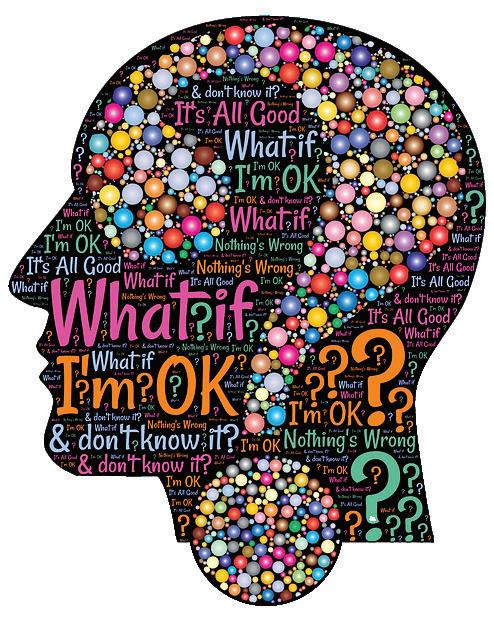
4 minute read
journey with anxiety
Articulating my feelings was a real struggle
Healing isn't a linear process and that's okay
Advertisement
Over the past few years, we have become much more open about discussing mental health, with social media being a huge factor in promoting therapy and positive wellbeing.
We are really trying to understand each other more and support one another through life’s trials and tribulations.
I’m only nineteen, but the past six years or so have taught me a lot as I have tried to navigate my way through my teenage years - but most of all, my anxiety.
Healing isn’t a linear process. But that doesn’t mean it’s not worth it.
My parents and I first started to notice my symptoms of anxiety around the age of 13 during meals out, holidays, and increasingly at school. From this point onwards, school was a challenge, especially with the pressure I put on myself to succeed. This was a difficult period for me, as I was suddenly experiencing a multitude of new emotions, not knowing what they meant or how to talk about them. I tried speaking to the school counsellor in year 10, and later tried therapy outside of school during sixth form. But I wasn’t ready. I didn’t know how I felt or how to speak about it. Articulating my feelings was a real struggle at this point, and I will always regret the impact this had on my parents as they struggled to understand what I was experiencing.
Then university came around. Although this was a scary concept, my anxiety when moving to Newcastle was surprisingly low. After taking a low dose of anxiety medication for two years prior, I gradually stopped taking it during first year as I noticed a significant change in myself. Getting out of the monotony of school, becoming more independent, and creating a more flexible routine gave me the space and time to work on my anxiety. It was so refreshing to feel more at ease, rather than waking up every day with a knot already tied in the pit of my stomach. Since moving to university, I have been much more proactive in trying to understand my anxiety, what triggers it and how to manage it. However, like I have said, the process is never straight-forward. I still have weeks where I lose my appetite, become physically exhausted from overthinking, and simply can’t beat my anxiety. It isn’t something that will just disappear, which is why I am more accepting of it - letting it happen and trying to manage it before it gets bad. I’m certainly getting the hang of it, but I’ve got a long way to go.
Healing, mental or physical, is never a linear process, and anxiety is a complex thing to understand. The constant ‘what if’s’, fear of judgement, pressure to achieve, cancelling plans last minute … I don’t think I will ever fully understand it all, but that’s okay. Anxiety has changed my life, but it won’t stop me living.
Image credit: Pixabay
Image credit: Unsplash
Hyper-independence: a good or worrying sign?
Lucy Reeves
decide how to live your life. But it doesn’t mean that you don’t need any support at all, whether it be from friends, family or professionals. As humans, we are always looking for connection with others, to live enjoyable and meaningful lives. Throughout our whole lives as independent adults, we will rely on each other, whether it be emotional support, advice when making decisions, or even help with mundane daily tasks.
Hyper-independence is independence taken to an extreme, when someone takes on all responsibility for every aspect of their life and doesn’t accept support, even when it’s really needed. They often take on too much work and then suffer with stress and burnout. Although it may seem that a hyper-independent person is thriving and has their life together, that is most likely not the case.
Hyper-independence is often a trauma response; it may develop as a coping mechanism to deal with other personal problems. Taking on all responsibility for yourself and having no reliance on others can give you a sense of control over your life, and can be a reassurance that you are a strong and capable person. On the surface, this appears to be a good thingmost of us look on with admiration at people we think have their lives organised and put together. The reality is that having this level of control over your life can be used to suppress and invalidate the problems in your life.
Hyper-independence
So when does independence become hyperindependence? To be independent is an exciting thing: you learn a lot about how to take care of yourself and you also have the freedom to
A hyper-independent person may be closed off when it comes to talking about personal problems with friends or professionals, believing that they can deal with it themselves and to admit they need support from someone else would show weakness. They would be confronted with the reality that problems exist in their life, and this is a scary thing. I think it’s very common for people to be reluctant to reach out for help when they really need it. There is still stigma attached to therapy, despite becoming a much more openly talked about topic. As with any mental health issue, the most change can be made when you actively acknowledge your problems yourself and make decisions to confront them. The same is relevant in the context of hyper-independence. It’s a good idea to be aware of your mindset, to question yourself about your lifestyle and habits, and to recognise where you might need emotional support in some way. For many students, living at uni is the first time experiencing this level of independence - and where some may struggle, some may thrive, and some may take it to an extreme. My advice is to be self-aware and to be open-minded.










